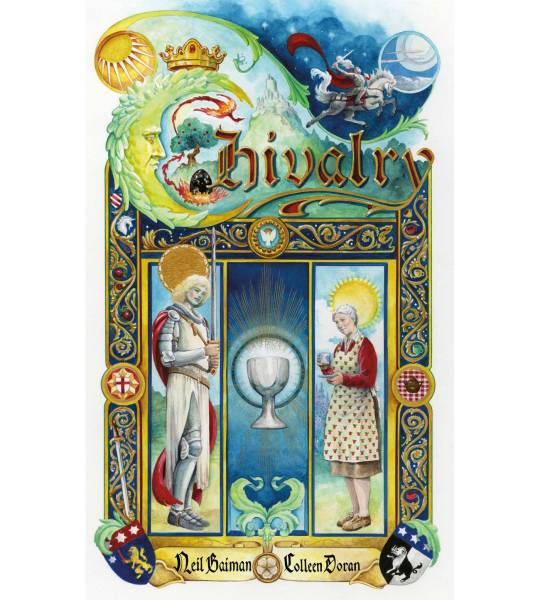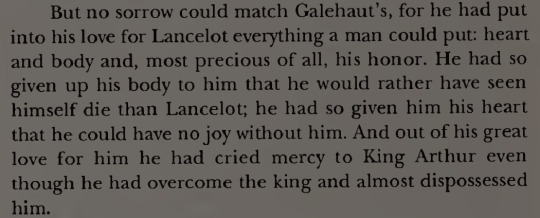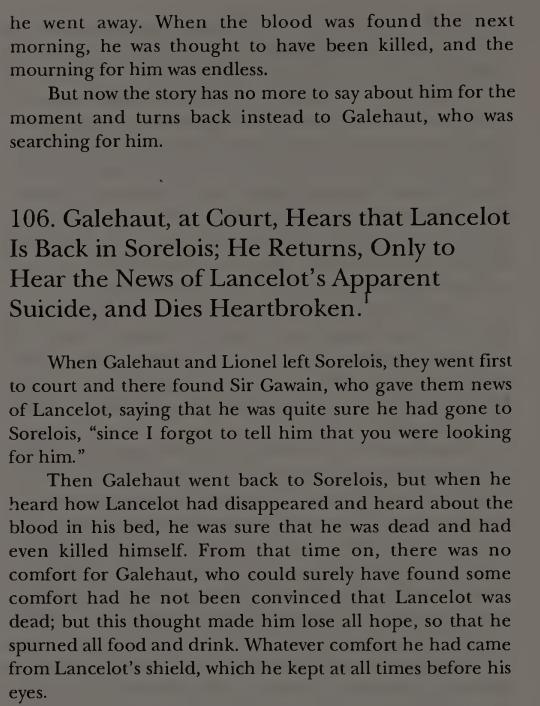#The vulgate
Explore tagged Tumblr posts
Text


—Vulgate Cycle: Lancelot Part II
#arthurian legend#arthuriana#arthurian legends#arthurian mythology#sir gawain#gawain#the vulgate#quotes#is this funny i think this is funny#guys read the vulgate#my post
705 notes
·
View notes
Text









He then proceeds to get rescued by Lancelot over three times.
This whole story happens beat for beat in the Vulgate by the way.
#knights am i right#sir galeshin#gawain useless cousin#galeshin#love that guy#art#arthuriana#He's a brother of dodinel the Wildman truly the cousin version of gaheris#comic#Arthurian literature#The vulgate#Valley of no return#tw death#tw skeletons#knightblogging
86 notes
·
View notes
Text
#random bullshit posts! go!#i was gonna post a Hot Arthurian Take abt guinevere but decided. i’m too high for drama rn#if people wanna know i still will but you’ve gotta protect me if people get mad (this is a joke)#beep beep richie#tumblr polls#the vulgate
19 notes
·
View notes
Text
PLEASE I CALL UPON YOU, ARTHURIAN FANDOM
Where can I read the Vulgate cycle?? Is it even available?.. Because I was trying to find it but as you can see I found nothing. So I would be really happy if anyone could help me...
Also would like to hear any other recommendations about Arthurian literature because so far I haven't read anything expect for "Death of Arthur" by Thomas Melory and I feel like I know nothing about the knights but I DON'T KNOW WHAT TO READ I KNOW THERE ARE SOME OTHER BOOKS I CAN'T FIND ANY OF THEM
*chocking with tears and dies*
#arthuriana#arthurian mythology#king arthur#arthurian legend#le morte d'arthur#arthurian literature#literature#the vulgate#help#repost please#if you can#BECAUSE I WANT TO READ
28 notes
·
View notes
Text

8 notes
·
View notes
Text
SAINT OF THE DAY (March 22)

March 22 is the liturgical memorial of Saint Lea of Rome, a fourth-century widow who left her wealth behind, entered consecrated life, and attained great holiness through asceticism and prayer.
Though not well-known as a figure of devotion in modern times, she was acknowledged as a saint on the testimony of her contemporary Saint Jerome, who wrote a brief description of Lea's life after she had died.
Jerome, a scholarly monk best known for his Latin translation of the Bible (the Vulgate), is the Church's only source of information on St. Lea, whose biographical details are unknown.
St. Jerome eulogized her in a letter written during the year 384 to his student and spiritual directee Marcella, another Roman consecrated woman who had left her aristocratic life behind after being widowed.
It is clear from his letter that Lea was a mutual friend to both Jerome and Marcella.
Jerome states that his account is written to “hail with joy the release of a soul, which has trampled Satan under foot, and won for itself, at last, a crown of tranquility.”
Jerome also contrasts the life of “our most saintly friend” with that of the late pagan public official, Praetextatus, held up by Jerome as a cautionary example.
“Who,” Jerome begins, “can sufficiently eulogize our dear Lea's mode of living? So complete was her conversion to the Lord that, becoming the head of a monastery, she showed herself a true mother to the virgins in it, wore coarse sackcloth instead of soft raiment, passed sleepless nights in prayer, and instructed her companions even more by example than by precept.”
Jerome describes how Lea, in her great humility, “was accounted the servant of all … She was careless of her dress, neglected her hair, and ate only the coarsest food. Still, in all that she did, she avoided ostentation that she might not have her reward in this world.”
Jerome's letter goes on to compare her fate to that of Praetextus – who died in the same year as Lea, after spending his life promoting a return to Rome's ancient polytheistic pagan religion.
The monk retells Jesus' parable of Lazarus and Dives, with Lea in the place of the poor and suffering man.
Lea, Jerome says, is “welcomed into the choirs of the angels; she is comforted in Abraham's bosom.
And, as once the beggar Lazarus saw the rich man, for all his purple, lying in torment, so does Lea see the consul, not now in his triumphal robe but clothed in mourning, and asking for a drop of water from her little finger.”
Thus Lea, “who seemed poor and of little worth, and whose life was accounted madness,” triumphs in salvation.
But the punishment of infidelity falls on the consul-elect — who had led a triumphant procession just before his death and had been widely mourned afterward.
Jerome ends his letter by urging Marcella to remember the lesson of St. Lea's life:
“We must not allow … money to weigh us down, or lean upon the staff of worldly power. We must not seek to possess both Christ and the world.
No; things eternal must take the place of things transitory; and since, physically speaking, we daily anticipate death, if we wish for immortality we must realize that we are but mortal.”
6 notes
·
View notes
Text
hey everyone who hates on guinevere and thinks she doesn't love lancelot should read that last line again and again and again.
I forgot to upload these 😭 lancelot and guinevere for my courtly love pals


#SCREEEAAMMMMM THEY THEY THEY!!!!!!!!!#arthurian legend#sir lancelot#queen guinevere#quotes#the vulgate
910 notes
·
View notes
Text
No, Sir Galahad is not in the Bible, and I never said he was.
OK, so in my series of posts and lectures about my work on Neil Gaiman's Chivalry, I pointed out that Sir Galahad's first appearance in Arthurian fiction was in the Vulgate, and that his name was originally spelled Galaad. Therefore the spelling in Neil Gaiman's Chivalry is correct, and Galahad is a later variant spelling.
Someone recently took me to task for saying this meant that I claimed Sir Galahad was in the Bible, and yet Sir Galahad appears nowhere in the Bible.
I never said Sir Galahad was in the Bible.
I said he was in the Vulgate.
Vulgate means "common version" in Latin.
The confusion here stems from the word "vulgate" which often refers to the 4th century Latin translation of the Bible commonly known as the Vulgate Bible.
But "vulgate" is also a term used to refer to The Lancelot-Grail Cycle, a 13th century French Arthurian cycle which is also known as the Vulgate or Vulgate Cycle -i.e. common version. Later translations of this work are known as Post-Vulgate.
Specifically, Galahad or Galaad appears in the Vulgate Queste del Saint Graal.
Happy to help.
Chivalry is available wherever fine books are sold, and you can come see me at the San Diego Comic Con Museum on October 4 where I will be signing and lecturing and showing art. Thanks.

2K notes
·
View notes
Text





incredible
361 notes
·
View notes
Text

Vulgate: Lancelot Part I | More quotes at Arthuriana Daily
#arthuriana daily#arthuriana#arthurian mythology#arthurian literature#arthurian legend#queen guinevere#sir lancelot#vulgate#the vulgate#vulgate cycle#quotes#my post
57 notes
·
View notes
Text

—The Vulgate Lancelot Part IV
gawain is good in battle and in actual fights but consistently embarrasses himself in tournaments. which is weird because he loves praise and attention
174 notes
·
View notes
Text

"Are you winning, son?" "No."
187 notes
·
View notes
Text
I barely remember any of the Vulgate cycle so I checked some chapters about Galehaut and by god I forgot that it was written Like That
Galehaut, trying to convince Lancelot (in disguise) to stay with him Forever, soon after meeting him:

Lancelot promised he'd stay only if Galehaut (who at the time was battling Arthur, and was very much victorious) withdrew his army, to which Galehaut's entire attitude was like: "this pains me not at all, since it is your wish". Lancelot's reaction to this:

Galehaut planning to keep Lancelot aaaall to himself:

Galehaut answering to the question what would he do to keep Lancelot's company forever:

Galehaut's grieving out of love for Lancelot:

Lancelot and Galehaut so worried about each other they're afraid to do anything not to hurt the other (and in the second screenshot both of them almost die because they're so worried)


Lancelot and Galehaut's Romeo and Juliet-like ending:


#they both also cry a lot and tell each other of their deep love and sleep together it's great#Galehaut doesn't know that his beloved Black Knight is Lancelot until Guinevere tells him after he arranged a meeting between the 3 of them#and it's such a sweet moment when Guinevere gives Lancelot to him#Gosh I wish the Vulgate cycle was an obligatory read to anyone who wants to write super historically accurate gritty historical fiction#if your historical fiction doesn't include men who keep fainting crying and talking about their love for another man#then how can it be accurate#arthurian
141 notes
·
View notes
Text

thigh wound (sorry about lancelot's legs jumpscare. blame god i guess
#arthuriana#lancelot#post vulgate#its 2 am right now if i regret it in the morning when im actually conscious ill delete it
68 notes
·
View notes
Text


how mordred was slain by arthur, and how by him arthur was hurt to the death, illustration by alfred pollard ; vulgate lancelot, death of arthur
a passage i think about all the time. the ray of sunlight in the wound is also mentioned in dante's inferno in canto XXXII, where mordred is in the 9th circle of hell. he's submerged in a frozen lake in caina, for treachery towards kin.

pretty neat!
#mordred#sir mordred#arthur#king arthur#arthuriana#arthurian mythology#arthurian literature#knights of the round table#thus did the father kill the son and the son mortally wounded the father.............#vulgate cycle#i was also going to put the mordred vs arthur scene in excalibur 1981 but it would make this post too long#its also a great scene tho go watch it#tbh arthuriana in the divine comedy is a whole post for antoher day#lancelot's also there in hell. somewhere#sir girflet#sir griflet#griflet#sorry i forgot to tag you king
69 notes
·
View notes
Text
This is my entire basis of Lancelot and Guinevere's relationship I fear. Like I've read so much stuff, but nothing has ever stood out as much as this:

Source: Lancelot IV, Vulgate Cycle, trans. Norris J. Lacy
#i could yap for a thousand years about them and specifically about this passage#plus i just imagine guin doing like the hollywood roman empire thumbs down#sir lancelot#queen guinevere#king arthur#vulgate cycle#arthuriana
100 notes
·
View notes